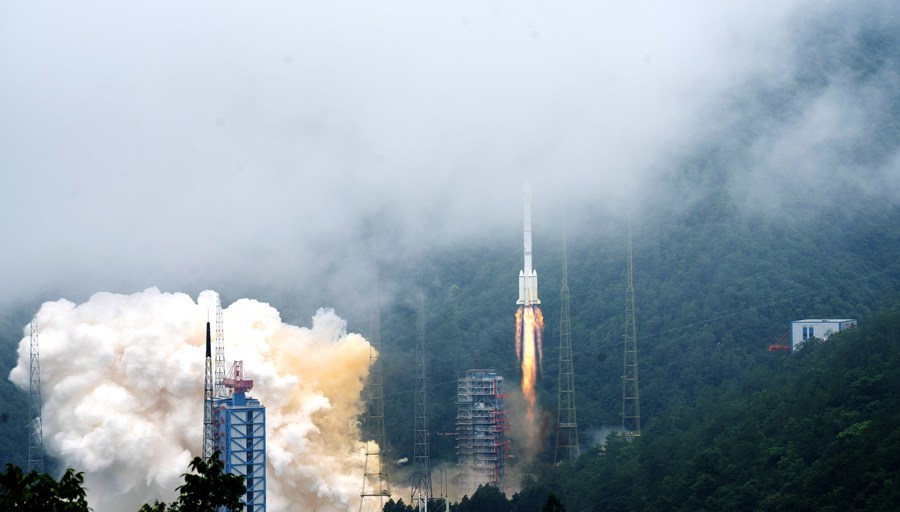

Chinese scientists have made invaluable contributions to the research and development of the country's BeiDou Navigation Satellite System (BDS). With all of its core components domestically made, it is one of the four global navigation networks, alongside the United States' GPS, Russia's GLONASS and the European Union's Galileo.
In the 502 laboratory of the fifth institute of China Aerospace Science and Technology Corporation, Gao Xing, an 80-year-old scientist who took part in the efforts to develop BeiDou, was holding a Solar Array Drive Assembly (SADA) when the reporter came to visit.
SADA can be compared to the shoulder joint in the human body. Its job is to make the solar panel rotate towards the sun, so as to continuously obtain energy and transfer it to the interior of the satellite. Although it looks like an insignificant part, to the experts, it is known as the "lifeline of the satellite".

A carrier rocket carrying the last satellite of the BeiDou Navigation Satellite System (BDS) blasts off from the Xichang Satellite Launch Center in southwest China's Sichuan Province, June 23, 2020. (Xinhua/Xue Chen)
In the initial stages of development of the BeiDou-1 project, when China had insufficient technical reserves, the country had no choice but to import SADA from other countries. In order to allow China to bring this "lifeline" firmly into its own hands, Gao Xing led the team to develop SADA independently.
In the 1990s, as there was a blockade on technologies imposed by other countries and China’s domestic component manufacturers were not sufficiently advanced, the SADA prototype that Gao Xing’s team developed faced major technical challenges.
In order to verify that the product prototype designed and produced by the team could withstand fluctuations in temperature of 60 degrees Celsius, Gao Xing set about designing his own experimental equipment and carried out the first temperature gradient experiment in China.
This experiment lasted three whole days and nights. After a long period of trial and error, Gao Xing’s team finally succeeded in developing the first domestically-made SADA.
Currently, there have been four series of domestically-made SADA covering more than 300 domestic products. For more than 30 years, 55 Beidou project satellites have been launched, thanks to pioneers like Gao Xing.
 Fire brigade in Shanghai holds group wedding
Fire brigade in Shanghai holds group wedding Tourists enjoy ice sculptures in Datan Town, north China
Tourists enjoy ice sculptures in Datan Town, north China Sunset scenery of Dayan Pagoda in Xi'an
Sunset scenery of Dayan Pagoda in Xi'an Tourists have fun at scenic spot in Nanlong Town, NW China
Tourists have fun at scenic spot in Nanlong Town, NW China Harbin attracts tourists by making best use of ice in winter
Harbin attracts tourists by making best use of ice in winter In pics: FIS Alpine Ski Women's World Cup Slalom
In pics: FIS Alpine Ski Women's World Cup Slalom Black-necked cranes rest at reservoir in Lhunzhub County, Lhasa
Black-necked cranes rest at reservoir in Lhunzhub County, Lhasa China's FAST telescope will be available to foreign scientists in April
China's FAST telescope will be available to foreign scientists in April "She power" plays indispensable role in poverty alleviation
"She power" plays indispensable role in poverty alleviation Top 10 world news events of People's Daily in 2020
Top 10 world news events of People's Daily in 2020 Top 10 China news events of People's Daily in 2020
Top 10 China news events of People's Daily in 2020 Top 10 media buzzwords of 2020
Top 10 media buzzwords of 2020 Year-ender:10 major tourism stories of 2020
Year-ender:10 major tourism stories of 2020 No interference in Venezuelan issues
No interference in Venezuelan issues
 Biz prepares for trade spat
Biz prepares for trade spat
 Broadcasting Continent
Broadcasting Continent Australia wins Chinese CEOs as US loses
Australia wins Chinese CEOs as US loses